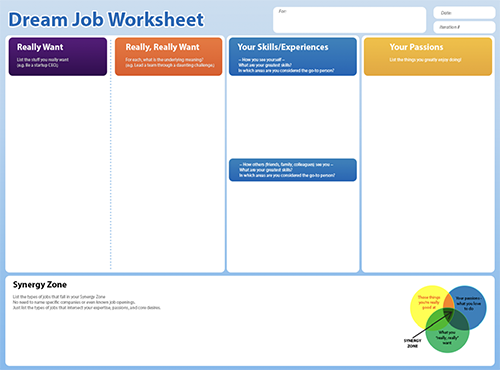Discover YOUR Dream Job in 45 Minutes [Worksheet Included]
What is your dream job?
It’s such an elusive question that confronts all of us at various points in our career.
Perhaps during times we wake up in the morning dreading the work ahead.
I don’t like this job?
I don’t feel like I’m adequately paid for the work that I do.
I don’t feel appreciated for my contributions.
The commute sucks, and I am often stuck in traffic.
Maybe it’s more subtle than that. I like this job, but I don’t feel really stimulated by what I’m doing.
For me, it was a job that wasn’t intellectually challenging yet I was being paid a lot of money. It was a senior role for a big company – but I still wasn’t happy.
So what makes a “dream job”?
Experience has taught me that the following components come in to play:
- The work is intellectually stimulating and challenging
- It involves something you are passionate about – and likely has been a passion for quite some time – often tied to a certain “purpose” in your life
- Incorporates an extremely comfortable work environment (whatever that means to you)
- Has plenty of growth potential (not just in title, but in true learning experiences)
- Is financially rewarding
The challenge for most of us is how do we find such a confluence?
It all starts with finding the intersection between these three elements:
- Skills – what are you very good at
- Passions – what do you love to do
- Market Needs – in what areas will the market pay handsomely for
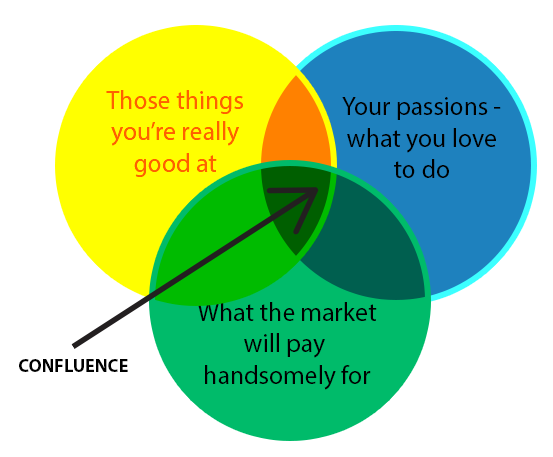
I read a great book several years ago by Keith Ferrazzi called Never Eat Alone. The book provided very practical tips for developing useful, professional relationships. Along the way, Keith used the term “blue flame” to describe the intersection of our talents and desires and suggested that a great force propelled us along once that flame was ignited.
I think it’s a terrific metaphor. Unfortunately, many people are unaware of their “blue flame” and are in jobs they consider to be mediocre. This is actually a curse because there isn’t enough pain to step back and question, “Is this what I really want?” And thus they lead their lives from one distraction to the next, feeling stuck in their situation yet not taking the initiative required to affect a change.
In a strange paradox, it is more often the people that are laid off or suffer some other professional upheaval who are willing to face the situation head-on and declare, “I’m going to do something about this.”
So, the first step toward finding your dream job is getting in touch with what you really, really want. And what you really, really want is one onion-layer deeper than what you really want.
Here’s what I mean.
Many people say they really want stuff (new house, new car, more money, etc.). I suggest that when you get to the “why” behind each “want” – then you begin hitting on the “really, really” want stuff. For example, for years I wanted to be the CEO of a new company. Whenever someone would ask me what I wanted or what my career goal was – my answer was always the same: I want to be the CEO of a startup company. Unfortunately, it took me years to even begin to contemplate the “why”. Why did I want to be the CEO of a startup? What was the meaning behind that?
As I sat down and gave serious consideration to the “why”, what I discovered was that I greatly enjoyed leading a team in a new endeavor with formidable challenges. I found tremendous meaning (for myself) in leading a group of people focused on such a daunting goal.
Oftentimes when we get what we want, we aren’t satisfied. Perhaps momentarily, but not for long. You see it all the time when you think, “If I only had _______.” And then you get it, and after a bit you realize it didn’t really bring you the happiness you expected.
Thus if I had been CEO of a services-based consulting firm, for example, I would have been miserable. There is no real product, and not much of a team to lead. (Often in a small consulting practice, each partner has her own book of business with her own clients.) But having the opportunity to run a software IT startup in the healthcare market was a dream come true for me.
When you begin focusing on what you “really, really” want then you begin to crystalize those things that can truly lead to great joy.
Worksheet for Success
Forget theory – let’s make this real. There are steps you can take right now to discover your dream job. I created a worksheet to help you with the process.
There are two versions you can choose:
- One where you can download it and print it out. In this version, you will be filling it out by writing directly on the form. Download this worksheet here.
- I also created a Google Docs version where you can use virtual post-it notes to stick on the worksheet. This version is for those of you who prefer to keep everything digital. Access the Google Docs worksheet here.
So, pick one of those and have it handy as we go through the rest of this article.
Identify Your Wants
It starts with making a list. What are the things you want – and for each of them, think about why you want it. What is the meaning behind the want?
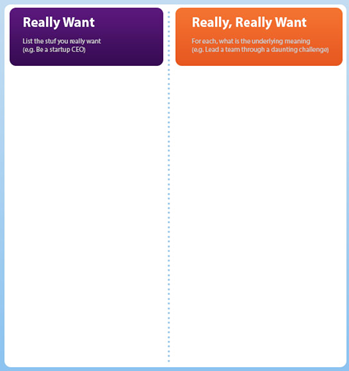 There are no wrong answers. If money is one of the items, list it. But also consider what it is that you’d like to experience with the money. Perhaps it’s a sense of achievement, or maybe peace of mind.
There are no wrong answers. If money is one of the items, list it. But also consider what it is that you’d like to experience with the money. Perhaps it’s a sense of achievement, or maybe peace of mind.
The key with this exercise is to be honest with yourself. There is no need to pretend you aren’t human or don’t have human desires. Most of us have healthy egos. It does no good trying to repress or deny that. But it can do a world of good to start looking at the why’s behind the things we want. You won’t be sharing this list with anyone, so go ahead and let it all hang out.
You may begin to see a pattern behind several of your wants as you dig into their meanings. Spend a few minutes on your list right now – go ahead, I’ll wait. At least get a couple items written down.
Where You’re Great
Now that we have a start at exploring what you really, really want – the next step is to examine those areas in which you’d be considered an expert, or at least very good.
If you asked your most genuine friends and trusted colleagues the following question, what would they say: In what areas would you say I’m pretty damn good?
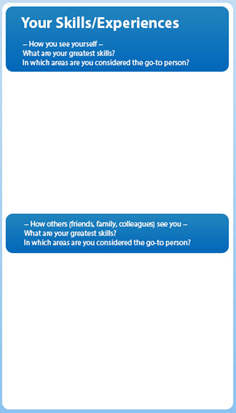 Another question to ask yourself is this: What am I the go-to person for?
Another question to ask yourself is this: What am I the go-to person for?
You can also try asking your family members what they think you’re good at – although keep in mind that the tacit adoration of relatives can hinder the opportunity for deep insights.
The responses to those questions are usually pretty good indicators of where your expertise lies. So let’s capture those items in another list.
A method that I’ve seen work well is to first put your own list together, answering the questions above based on what you think your genuine friends, trusted colleagues, and insightful family members would say. In parallel, reach out to those people and ask them to answer these questions for you:
- In what areas would you consider me to be an expert or at least very good?
- In which arenas do you see me as the “go-to” person?
- If you were building a team where I would be your top-pick, what would be the focus area?
Oftentimes the way others see us is far different from how we see ourselves. Thus, doing this exercise from both perspectives is very important.
What You Love Doing
Tapping in to your passions is one of the most fun exercises you can complete. What are all the things you greatly enjoy doing? Don’t hold back – remember this is private – just write them all down.
Some questions to help with this exercise:
- What have been some of your greatest moments of happiness and fulfillment?
- What activities do you greatly enjoy and find the most fulfilling in your professional life?
- If you think back over the past year, what were you doing in those instances when you were “in the zone” and could have gone 24 hours without sleep?
- If you are a college grad, why did you choose your particular field of study?
It’s OK to list things that are not professional (e.g. perhaps you really enjoy sleeping – I know I do). The key here is to get everything out on the table so that we can begin to craft the ideal role(s) where you will be most fulfilled.
The first time I did this exercise, my “greatest moments” tended to be cases where I had overcome some significant challenge. In one instance, I had a crazy idea for a new mainframe for Unisys Corporation (at the time, I was an engineer for the company). One of the smartest senior engineers at Unisys (a person with the title of “Distinguished Fellow”) reviewed my concept and declared it could never be done.
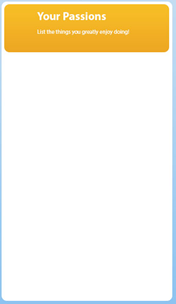 At the time, I didn’t know if it could or couldn’t be done, but I had a strong sense that his reluctance was less based on the laws of physics and more based on politics and other such shenanigans that often occur in large companies. So, I spent a weekend of my own time and fleshed out the concept – I worked the entire weekend without sleep because I was so filled with excitement that it could actually be successful.
At the time, I didn’t know if it could or couldn’t be done, but I had a strong sense that his reluctance was less based on the laws of physics and more based on politics and other such shenanigans that often occur in large companies. So, I spent a weekend of my own time and fleshed out the concept – I worked the entire weekend without sleep because I was so filled with excitement that it could actually be successful.
I came back to the office on Monday and presented the company with my idea plus the logic diagrams showing that it could indeed be done. That mainframe went on to generate millions of dollars for Unisys, and I was very proud of the feat. That was my first sense that I really enjoyed leading a team of people to build amazing products. Of course, I was still too young, naïve, and selfish to see it that way – in my mind, I thought I wanted to be a CEO so I didn’t have to deal with naysayers like this Distinguished Fellow telling me it couldn’t be done.
So, put together your list of what you enjoy doing. As you list more and more items, you will begin to see “trends” where you’ve been the most motivated and extracted great satisfaction from your activities.
Where Magic Happens
Hopefully you felt some excitement completing those last few exercises. But we’re shooting for much more than just some momentary thrill – we’re on our way to helping you identify your dream job.
At this point, you might be wondering where all this is going. Answer: The Synergy Zone.
And I can guarantee you that when you are there, it feels magical. The Synergy Zone is the intersection of all the exercises we’ve been completing thus far. And this is where your dream job lives.
So, the final exercise is to list the types of jobs that fall in your Synergy Zone. At this point, there is no need to name specific companies or even known job openings. For now, just list the types of jobs that intersect your expertise, passions, and core desires.
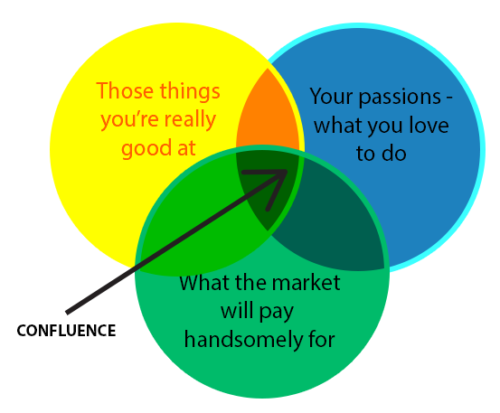
Some of these roles will have little income potential while others might be high. So, let’s use a simple H, M, and L indictor for each role identifying if it has High, Medium, or Low income potential.
For example, let’s say you are a good creative designer who is competent with all the hot web tools/platforms (e.g. WordPress, PHP, CSS, wire-framing, etc.). You love designing and figuring out how to take someone’s amorphous website concepts and turning them into an attractive, concrete reality. And, you really, really want to work for yourself – either as your own company or as an independent contractor. Then the role of web designer would likely fall into your Synergy Zone. The income potential for such a role is probably an H. I know many people making a ton of money as web developers – hence the “H” indicator.
I recently spoke with a person who’s been working for recruiting firms over the past five years. He’s not happy and is looking to do something more aligned with his skills and passions, particularly in a larger firm with solid benefits and room to grow. He thoroughly enjoys working with people and majored in psychology because of his love for understanding how to relate to people. On the skill front, he is a good business-problem-solver and is considered a superb listener. He asks probing, insightful questions and quickly gets to the core of issues.
From this very brief list, we quickly identified several roles that fall in his synergy zone: combining his skills, passions, and wants. One that particularly grabbed his attention is working for a reputable consulting firm, such as a McKinsey or Accenture, particularly on the resource deployment and staffing management fronts. Given his experience in recruiting for the past several years, he could quickly hit the ground running leveraging his skills to make an immediate impact on a firm and its clients.
So, list all the types of roles you can think of that fall in your synergy zone. If it crosses your mind, get it on the list.

Now take your list and look at those with an M or an H indicator. These represent that magical confluence of your skills, passions, and market demand.
Imagine working in a role that combines all three. Imagine waking up every day excited about the work you are about to do. Imagine the feeling of being able to honestly say, “I can’t believe I get paid to do this!” That’s what it’s like working in your Synergy Zone. And this first step – the most crucial, and quite frankly the hardest – of identifying those potential roles puts you on a path toward achieving that reality.
Hopefully you’ve already printed my Dream Job worksheet and have been filling it out. If not, click on the image below to print your own and get started.
If you’d like to use an online version of this worksheet, I created a version of the Dream Job Worksheet in Google Docs. This version enables you to create mini post-its in each section and other cool editing features. See the Getting Started section on the right side of the Google Doc and then you’ll be good to go. Let me know in the comments below if you have any problems or questions with this Google Doc.
Life is too short to be in a job you don’t love – or to be unhappily unemployed. I recently helped a woman identify and land her dream job at Zynga – including renegotiating a huge bump in her base salary and relocation package. She followed all the tips above. You can too. Discover your dream job and get started on the path toward loving what you do.
